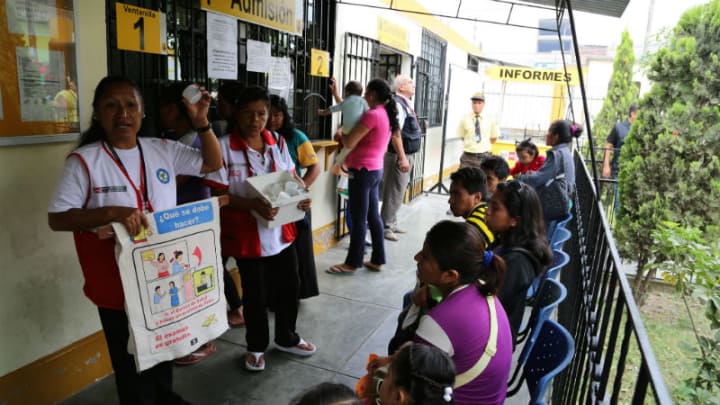
A couple of years ago a reporter asked me how I, as the U.N.’s special envoy on Tuberculosis, could emphatically state that TB was a threat to the security of the United States. I often get asked this question, and before giving an answer an agreement must be reached on the definition of global health security.
According to the Global Health Council: “Global health security means having strong public health and emergency responses in place around the world to stop the spread of infectious diseases across borders and to detect, prevent, and respond to biological threats from emerging infectious diseases, man-made pathogens, and biological weapons to other pandemics, and preventable diseases.” Under this definition, TB is a global health threat; it can be anywhere and everywhere, and it is the leading infectious disease killer in the world.
“We should not engage in a debate about existing or emerging infectious diseases without addressing the real need to deliver universal health coverage.”
—Over the past decade, countries, and the global health community at large, have begun to embrace the intersection of global health and security and the issues that come with it. This includes strengthening health systems and recognizing that host countries, while they may not be able to tackle their health problems alone, need to start taking control of their own destinies.
In a recent article featured in The Lancet Global Health, the authors state that the declaration by African heads of state and government in July this year “serves as a new African public health order in addressing health security and inequities on the continent.” They make the case that the declaration “offers a momentous opportunity for renewed engagement for strengthening health systems to accelerate implementation of the International Health Regulations and other commitments using a broader multisector approach including public-private partnerships.”
There is no doubt that the relatively recent examples of infectious diseases, Zika and Ebola, raised international attention, particularly when they hit U.S. shores. In fact, it is fair to say that both outbreaks raised Americans’ consciousness about global health security. Moreover, faced with the threat — although remote — of contracting either disease, they wanted to know what action their government was taking. As the Global Health Council said in 2017, people suddenly “saw that in an increasingly interconnected world, global health security efforts are vital to protecting both health around the world and the health of American citizens.”
They also saw a connection to U.S. investment in the world’s ongoing fight against global health diseases, including HIV/AIDS, TB and malaria. U.S. global leadership and investment in response to health crises have saved countless lives and played a critical role in putting robust international responses in place to protect both Americans and vulnerable populations in the world’s poorest places.
I was privileged to serve at the State Department as the U.S. global AIDS coordinator and head of the Office of Global Health Diplomacy, where we spent considerable time discussing global health security as a national priority. If we are to safeguard our own health and prevent the spread of disease, the U.S. needs a sustained approach to global health security, bolstered by international cooperation. Key to this effort must be making smart investments to strengthen public health systems and health service delivery. These systems — from hospitals to health workers to medical labs — act as our first line of defense against disease. It is critical to ensure that both U.S. states and partner countries overseas can detect and report outbreaks before they become pandemics. Furthermore, strong health systems also drive economic growth and work to ensure that U.S. foreign aid is well invested.
We must also invest in new tools and technologies to prevent, detect, and respond to emerging disease threats. Thus far, countries across the globe have not made investment in research and development a priority. As was seen with the Ebola and Zika outbreaks, there was a shortage of appropriate drugs, diagnostics, and vaccines to manage the responses, necessitating a rapid mobilization of emergency R&D resources, according to PATH. Such shortages will never permit us to get ahead of emerging health crises.
Finally, we should not engage in a debate about existing or emerging infectious diseases without addressing the real need to deliver universal health coverage. Tackling infectious diseases includes a commitment to the central tenets of UHC, including financial risk protection, access to quality essential health care services, and the use of safe, effective, and affordable medicines. Moreover, UHC means countries and civil society must put systems in place that are strong enough not only to focus on treatment but on monitoring and surveillance as well.
Americans do not live in a bubble. We are not isolated from global health threats. Nor are we immune to the tragic impact these diseases can have. We are living with our heads in the sand if we don’t think another Zika or Ebola will come our way, or, for that matter, a TB outbreak like we have seen in several southern U.S. states. Global health and our individual, national, and international security are inextricably linked. It is time that we act accordingly.
Examining how global health affects security and vice versa, Devex, PATH, and Johnson & Johnson look at how country governments, donors, foundations, the private sector, and civil society can better respond to and anticipate threats, asking whether increased investment in global health security is critical to the security of all countries. Join our conversation on preparing for the unexpected by visiting the From Healthy to Secure site and tagging #Health4Security and @Devex on social media.




